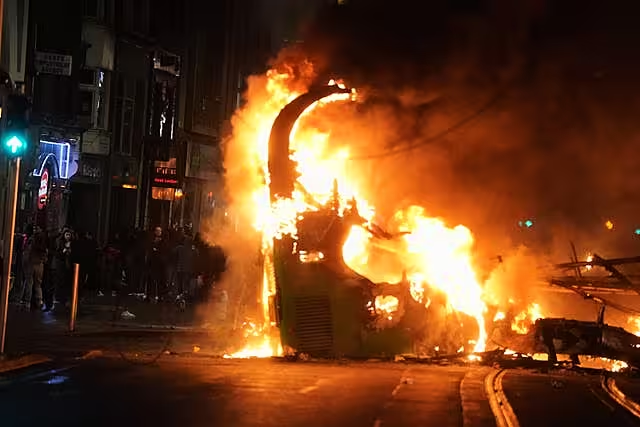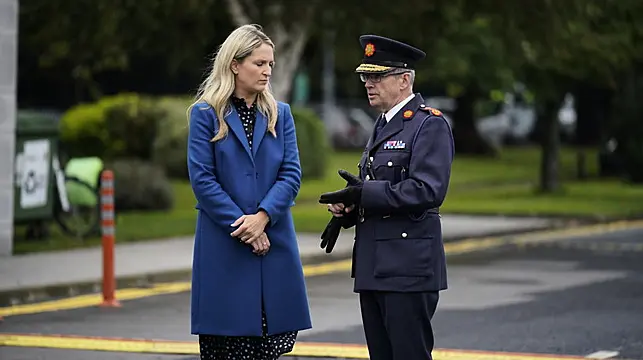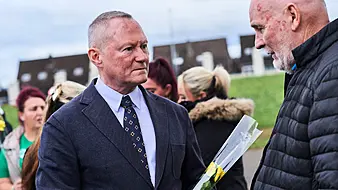Minister for Justice Helen McEntee has said it is “difficult” for her to use her powers to direct gardaí on new priorities without a request from the Commissioner.
Ms McEntee made the comments while appearing before the Oireachtas justice committee more than two weeks after a stabbing attack near a school and violent riot in Dublin city centre in which garda vehicles, a bus and a tram were burned.
Under legislation, the minister has the power to revise priorities for An Garda Siochana.
She told the committee that she regularly engages with the commissioner to see if gardaí have the relevant powers they need to investigate or respond to crime, but added that she was “not aware” there were any changes required.
Ms McEntee, who survived a confidence motion on her position this week, told the committee that the policing response to the riot had not failed.
The minister said gardaí had policed 800 protests in 2023 and that several arrests had been made as part of a “graduated response”.
However, while accepting there had been arrests at protests, Green Party TD Patrick Costello told the minister that he had not seen any arrests for incitement, conspiracy or organising the protests, as he argued that the beginning of any graduated response should be prevention.

Mr Costello said he was “very concerned about the vulnerability of the State” from “violent, dangerous, anti-democratic elements”.
Ms McEntee said gardaí are taking the matter of protests “very seriously” and that it was not the case that nothing was being done.
Further referencing arson attacks at makeshift and official accommodation centres for refugees, Mr Costello added: “All the technology and tools we can give the guards are useless if we’re not policing the right things.”
He asked the minister if she had used her powers under the Garda Siochana Act 2005 to seek a revision of priorities or directions given to gardaÍ following the assault of a TD last year.
She said: “I’ve not been asked to make any changes. I regularly meet with the Commissioner to make sure he has the relevant powers that he needs.”
Ms McEntee added: “It’s very difficult for me to give a direction to a Commissioner if they feel that the powers that they have are sufficient.”
The minister said it was important that she is not “forcing something on the Commissioner that the gardai do not need”.
She said she had responded to a request for greater incitement to hatred legislation, as well as technology such as body cameras.
Separately, Labour justice spokesman Aodhan O Riordain asked the minister about where her responsibilities lie following a social media post from her Fine Gael party that said she had “fast-tracked” the attestation of gardaí out of the Templemore training college.
Justice Minister @HMcEntee has fast-tracked the attestation of trainee Garda in Templemore, meaning we will see more Gardaí on the beat before Christmas.
This is another way Fine Gael is building stronger, safer communities. pic.twitter.com/tRb3VA6MVF— Fine Gael (@FineGael) November 29, 2023
It was later clarified that this had been the Garda Commissioner’s decision.
Ms McEntee told Mr O Riordain that she had never claimed to be able to send members out of the training college early.
She said: “The Garda Commissioner obviously engaged with me before that decision was taken, I obviously supported that decision, but it’s not my decision.”
Asked if she would ask her party to delete the post, she replied that she had been clear it was not her decision to send the gardaí out early.
Ms McEntee also said the college was on track to have 700-800 recruits begin training by the end of the year, with 637 starting to date.
However, Senator Bobby Gallagher said the fact this involved bringing new recruits into the training college in the last week of December seemed to be a “cynical” mathematical exercise to keep the annual numbers up.
Ms McEntee said it was better to have the class start this year rather than delaying it further and into 2024.
Mr Gallagher also asked about a dispute in the Dail about when the Government first engaged the school community following the stabbing attack which preceded the riot.

Sinn Féin leader Mary Lou McDonald had said it took nearly two weeks for Government to engage with the school community, in a remark understood to refer to affected parents.
Ms McEntee told the committee that the school immediately received a response from the Department of Education and that she had personally engaged with the principal on the following Monday.
She added: “More recently, this week, I met with the parents and that was very much guided by them. So everything that I’ve done has been guided by what they want.”
Asked about comments from the chair of the Policing Authority who appeared to contradict a previous claim from the minister that she had asked the body to provide clarity on the use of force to gardaí, Ms McEntee said there had been a “misunderstanding”.
She told the committee that she had been clear and had not asked the Authority to outline exactly what circumstances in which force should be used.
“What I’ve asked them to do is essentially confirm that they can use their powers.”
As part of a response to Senator Lynn Ruane who had asked what Government was doing to address social deprivation being a driver of violence, Ms McEntee said: “There’s no personal circumstance that forced anybody to set a bus alight, to attack a member of gardaí, to loot. We can’t excuse it.
“But at the same time, I absolutely appreciate we have to try and support people and work with people at the earliest stage possible to prevent it from ever getting to that point.”

Ms McEntee was also asked if she would like to withdraw or apologise for her previous use of the word “scumbags” to refer to people who engaged in the riot.
She said: “I’ve said what I said, I won’t take it back.”
Ms McEntee said she was not targeting a group of people but was instead referring to the riotous behaviour.
Asked for a definition of the term “far right” by Senator Sharon Keogan, the minister said it was a political ideology and that she considered it to include people who see themselves as anti-government, anti-state, anti-immigration and anti-women’s rights.
Ms McEntee also said it was not a crime to be far right.







